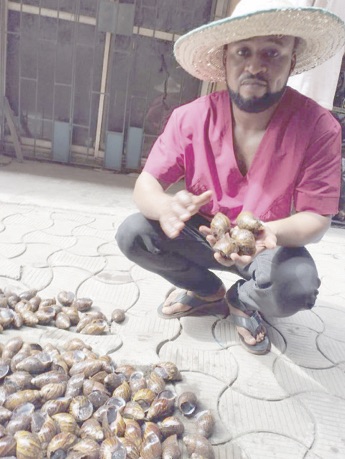By Chinyere Anyanwu
Mr. Smart Chukwudi, the Chief Executive Officer of Smart360 Farms Limited, is an Accounting graduate of Abia State Polytechnic, who forayed into agriculture after failing to secure a good paying job post-graduation.
Smart, who has been farming snails on a commercial scale for eight years, shares his experience in the country’s agricultural landscape, challenges bedeviling the sector and strategies to make the sector youth-friendly, among others.
First contact with snail business
I grew up in my village in Abia State, and my mother used to pick snails from the bush. So we used to go out at night to spread pawpaw leaves in the bush, and when the snails came out to eat them, we would pick and sell them. My mother saw me through school with the proceeds from the snails we picked and sold. I used to take some of the snails to school to sell to lecturers. A lot of people began calling me “snail man,” but I hated the name. Over time, people began to ask me for snails, but I wasn’t farming them then. So I picked interest because it’s very costly. For instance, one jumbo-sized snail is N3,500.
When I graduated, I got a job at a filling station, and they were paying me a N35,000 monthly salary, but people were still calling me to supply them snails. So I worked for about six months, and when I compared the effort, time, and energy I invested in the job—coupled with the attending stress—with the amount I was being paid, I felt it wasn’t worth it. So I decided to leave the job and concentrate on farming snails.
I was based in the East then, but because of my decision to go fully into snail farming, I had to relocate to Lagos because most of the people placing orders for snails were in Lagos. I went for the training, and within a few months, I started my own. I started with training people. After a while, I rented a place in Ogun State where I started my own snail farming.
Unfavourable operating environment
Operators in the agricultural sector are contending with numerous issues that hamper the productivity of the sector. Major among them is lack of access to credit. People need funds for agricultural production, especially starters. For instance, when I was venturing into agribusiness, I approached some banks. They were asking for collateral that I didn’t have. One of them that showed interest in giving me a loan of N1 million was asking for 50 per cent interest. How can a smallholder farmer survive under that kind of condition?
Insecurity has done a great deal of damage to the country’s agricultural productivity. Take Benue State, the food basket of the country, for example. You see the level of wastage of lives and property going on there. The majority of them have abandoned their farms because of fear of being killed, and herders have taken over a lot of farmlands. This is affecting food availability and affordability. People who ought to be productively engaged in farming are idling away in IDP camps. This is something the government has to tackle decisively; otherwise, it’s going to affect the sustainability of agriculture in the country.
Unavailability of regular and stable power supply hampers agricultural productivity a great deal. There are so many agricultural activities that require electricity, especially the processing aspect, and lack of electricity can adversely affect such activities. For instance, I’ve had to spend huge sums of money repairing my refrigerator where I store processed snails because there’s usually an irregular power supply, and I’m forced to power it with a generator. This has resulted in the damage of the compressor.
Deficient infrastructure, such as poor road networks, militates against Nigeria’s food production activities. Access roads to the hinterland where major agricultural activities are carried out are not there. This results in a whole lot of ripple effects on farmers’ livelihoods and food availability.
Way out of the woods
The government has a lot to do in order to take agriculture and agribusiness to where they should be—impacting the country’s economy and the practitioners’ lives positively. Among steps to take include: providing stable electricity; making funds available at low interest rates and ensuring they are accessible to real farmers; giving proper attention to our road networks for easy access to and from farms; and tackling insecurity headlong.
To end insecurity and its effects, the government should enact a law that protects farmers and their produce. Making ranching a must for cattle rearing in the country will put a stop to the movement of cattle from one location to another, and this, in effect, will curtail encounters between herders and farmers. That’s how cattle rearing is done in other countries of the world. It’s appalling that with all the killings and destruction going on, nobody has been brought to book. Herders go around with guns and other weapons, and the government is not saying or doing anything. Farmers cannot do the same because they are afraid of the law. It’s just like the law is favouring one side. The government needs to make an enforceable law that punishes offenders.
Attaining food security
One of the ways Nigeria can become food secure and cut down on importation is by the government investing in local production and processing. Instead of importing, the government should support smallholder farmers with land, inputs like fertilisers, improved seeds, and finance, etc. They should also tackle post-harvest losses by investing in processing. With this, excess produce, whenever there is a glut, would be converted to a longer-lasting product, thereby ensuring food availability.
Creating a youth-friendly agric sector
As a youth, when you hear of agriculture, what will come to your mind is that it is a dirty job and that it is a poor man’s business. I have some friends who call me on the phone and say, “snail man,” when they see my advert online, but I know I am doing better than them. So I think the government should change the narrative by putting things in place that will make people start seeing agriculture as a smart means of livelihood instead of a dirty and poor man’s job. This can be done through the introduction of technology into agricultural practice. That is what will make young people come into agriculture.
Another issue the government should deal with, as a step toward making agriculture attractive to the younger generation, is to build good road networks across the country to enable farmers to transport their produce from the farm to the market. Nobody wants to trek for two hours to the farm and back looking worn out and tattered. No one would like to venture into such a business after seeing such a sight. So infrastructure has a lot to do in restructuring agriculture.
Access to loans is also very crucial in restructuring agriculture. It will encourage a lot of young people to venture into the sector when they know they will get financial support from the government to grow their businesses.
And for private sector operators, there are a lot of them who are willing to invest funds in agriculture if they are given some incentives like tax holidays.
Policies that will create an enabling environment for their investments to flourish should also be put in place, and the implementation of these policies should be closely monitored. Sometimes, the government puts out favourable policies, but some people take advantage of the government’s inability to effectively monitor their enforcement to make nonsense of them.
Advice to youths
From my experience, I know a lot of youths who would want to engage in agriculture and agribusiness, but they are feeling discouraged because of the myriad of challenges confronting the sector. I am encouraging them to take the bold step of starting. They can start small, even in the comfort of their homes. In the past eight years of my being in agribusiness, I have trained millions of youths in snail farming and palm weevil larvae farming, and they are doing well. So it’s no longer time to sit and say you are doing nothing. You should be ready to get your hands dirty to make money and also be willing to learn. You must be open-minded. You must be willing to help yourself.

















Leave a comment